 W
WThe Ten Commandments, also known as the Decalogue, are a set of biblical principles relating to ethics and worship. These are fundamental to both Judaism and Christianity. The text of the Ten Commandments appears twice in the Hebrew Bible: at Exodus 20:2–17 and Deuteronomy 5:6–17.
 W
WThe Ten Commandments are a series of religious and moral imperatives that are recognized as a moral foundation in several of the Abrahamic religions, including Catholicism. As described in the Old Testament books Exodus and Deuteronomy, the Commandments form part of a covenant offered by God to the Israelites to free them from the spiritual slavery of sin. According to the Catechism of the Catholic Church—the official exposition of the Catholic Church's Christian beliefs—the Commandments are considered essential for spiritual good health and growth, and serve as the basis for Catholic social teaching. A review of the Commandments is one of the most common types of examination of conscience used by Catholics before receiving the sacrament of Penance.
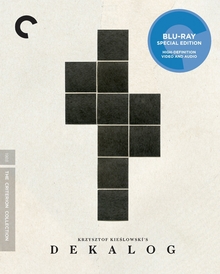 W
WDekalog is a 1988 Polish drama series of films directed by Krzysztof Kieślowski for television and co-written by Kieślowski with Krzysztof Piesiewicz, with music by Zbigniew Preisner. It consists of ten one-hour films, inspired by the decalogue of the Ten Commandments. Each short film explores characters facing one or several moral or ethical dilemmas as they live in an austere housing project in 1980s Poland.
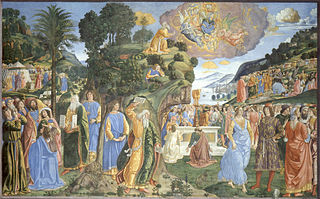 W
WThe Descent from Mount Sinai is a fresco by the Italian Renaissance painter Cosimo Rosselli and his assistants, executed in 1481–1482 and located in the Sistine Chapel, Rome. It depicts the prophet Moses in the process of receiving and introducing the Ten Commandments.
 W
WLe Diable et les Dix Commandements, is a French comedy-drama film from 1963, directed by Julien Duvivier, written by David Alexander and Michel Audiard, starring Michel Simon and Louis de Funès (uncredited). The cast list includes several famous French actors: Simon, de Funès, Fernandel, Danielle Darrieux, Lino Ventura, Jean-Claude Brialy, Charles Aznavour and a very young Alain Delon.
 W
WLes Dix Commandements is a French-language musical comedy written by Élie Chouraqui and Pascal Obispo that premiered in Paris in October 2000.
 W
WThe "finger of God" is a phrase used in the Bible. In Exodus 8:16–20 it is used during the plagues of Egypt by the Egyptian magicians. In Exodus 31:18 and Deuteronomy 9:10 it refers to the method by which the Ten Commandments were written on tablets of stone that were brought down from biblical Mount Sinai by Moses.
 W
WGlassroth v. Moore, CV-01-T-1268-N, and its companion case Maddox and Howard v. Moore, CV-01-T-1269-N, 229 F. Supp. 2d 1290, affirmed, 335 F.3d 1282, concern then-Alabama Supreme Court Chief Justice Roy S. Moore and a 21⁄2 ton granite monument of the Ten Commandments in the rotunda of the Heflin-Torbert Judicial Building in Montgomery, Alabama.
 W
WGreen v. Haskell County Board of Commissioners, 568 F.3d 784, was a First Amendment case concerning the placing of a Ten Commandments monument on public property, an alleged violation of the separation of church and state.
 W
W"Honour thy father and thy mother" is one of the Ten Commandments in the Hebrew Bible. The commandment is generally regarded in Protestant and Jewish sources as the fifth in both the list in Exodus 20:1–21, and in Deuteronomy (Dvarim) 5:1–23. Catholics and Lutherans count this as the fourth.
 W
WI Am is a 2010 faith-based, non-linear, drama film written and directed by John Ward, produced by John Ward, Chris Marcus, and professional baseball veteran Todd Zeile, through Bay Ridge Films and Upper Room Media and released by 20th Century Fox. Co-produced by Stefan Hajek and Aaron Breeden, and shot and edited by Chris Marcus, the film stars Tomas Boykin, Jay Hindle, Todd Zeile, John Ward, Greg Fisk, Amy Holland, Christinna Chauncey, and Stefan Hajek. On October 10, 2010, the film had a limited release in 2,500 churches worldwide in preparation for its DVD release of November 2, 2010.
 W
W"I am the LORD thy God" is the opening phrase of the Ten Commandments, which are widely understood as moral imperatives by ancient legal historians and Jewish and Christian biblical scholars.
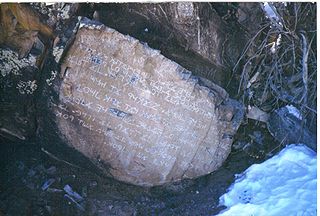 W
WThe Los Lunas Decalogue Stone is a large boulder on the side of Hidden Mountain, near Los Lunas, New Mexico, about 35 miles (56 km) south of Albuquerque, that bears a very regular inscription carved into a flat panel. The stone is also known as the Los Lunas Mystery Stone or Commandment Rock. The stone is controversial in that some claim the inscription is Pre-Columbian, and therefore proof of early Semitic contact with the Americas.
 W
WMoses Breaking the Tablets of the Law is a 1659 painting of the prophet Moses by the Dutch artist Rembrandt. It depicts Moses about to break the original two stone tablets inscribed with the Ten Commandments. It is now in the Gemäldegalerie, Berlin.
 W
WThe Prince of Egypt is a musical with music and lyrics by Stephen Schwartz, and a book by Philip LaZebnik. Based on the 1998 Biblical animated film of the same name, the musical follows the life of Moses from being a prince of Egypt to his ultimate destiny to lead the Children of Israel out of Egypt.
 W
W"Remember the sabbath day, to keep it holy" is one of the Ten Commandments found in the Hebrew Bible.
 W
WThe Ritual Decalogue is a list of laws at Exodus 34:11–26. These laws are similar to the Covenant Code and are followed by the phrase "ten commandments". Although the phrase "Ten Commandments" has traditionally been interpreted as referring to a very different set of laws, in Exodus 20:2–17, many scholars believe it instead refers to the Ritual Decalogue found two verses earlier.
 W
WThe Tables of the Law is a 1944 novella by German writer Thomas Mann. It is a dramatic retelling of the Biblical story of Moses contained in the Book of Exodus, although some of the laws which Moses proscribes for his followers are taken from Leviticus. It was the only story that Mann was ever commissioned to write, and he finished it in just eight weeks, beginning on January 18, 1943, and ending on March 13, 1943. Publisher Armin L. Robinson, believing the Ten Commandments to be the basis on which civilization was founded, wanted to make a movie detailing the Nazis' "desecration of the Mosaic Decalogue." Instead, he settled on a book, entitled The Ten Commandments: Ten Short Novels of Hitler's War Against the Moral Code, with ten authors, one for each commandment. Mann's novella, which he was paid $1000 to write, was originally meant to be the introduction to the volume, but Robinson liked it so much that he decided to make it the first story, under the heading "Thou Shalt Have No Other God Before Me." Mann considered his story to be greatly superior to that of his fellow contributors, and he considered the overall book a "failure".
 W
WAccording to the Hebrew Bible, the Tablets of the Law as they are widely known in English, or Tablets of Stone, Stone Tablets, or Tablets of Testimony in the Exodus 34:1, were the two pieces of stone inscribed with the Ten Commandments when Moses ascended biblical Mount Sinai as written in the Book of Exodus.
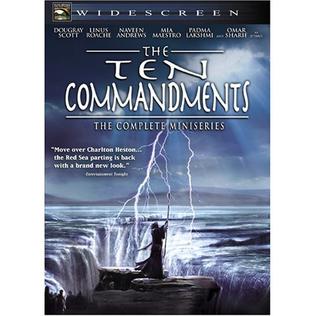 W
WThe Ten Commandments is a 2006 miniseries that dramatizes the biblical story of Moses. It ran on the ABC TV network.
 W
WThe Ten Commandments is a 1923 American silent religious epic film produced and directed by Cecil B. DeMille. Written by Jeanie MacPherson, the film is divided into two parts: a prologue recreating the biblical story of the Exodus and a modern story concerning two brothers and their respective views of the Ten Commandments.
 W
WThe Ten Commandments is a 1956 American epic religious drama film produced, directed, and narrated by Cecil B. DeMille, shot in VistaVision, and released by Paramount Pictures. The film is based on Prince of Egypt by Dorothy Clarke Wilson, Pillar of Fire by J. H. Ingraham, On Eagle's Wings by A. E. Southon, and the Book of Exodus. The Ten Commandments dramatizes the biblical story of the life of Moses, an adopted Egyptian prince who becomes the deliverer of his real brethren, the enslaved Hebrews, and thereafter leads the Exodus to Mount Sinai, where he receives, from God, the Ten Commandments. The film stars Charlton Heston in the lead role, Yul Brynner as Rameses, Anne Baxter as Nefretiri, Edward G. Robinson as Dathan, Yvonne De Carlo as Sephora, Debra Paget as Lilia, and John Derek as Joshua; and features Sir Cedric Hardwicke as Sethi, Nina Foch as Bithiah, Martha Scott as Yochabel, Judith Anderson as Memnet, and Vincent Price as Baka, among others.
 W
WThe Ten Commandments is a 2007 American computer animated film directed by John Stronach and Bill Boyce, and released by Promenade Pictures. The film follows Moses from his childhood, as the adopted grandson of Pharaoh, to his adulthood, as the chosen one of Yahweh and liberator of his people.
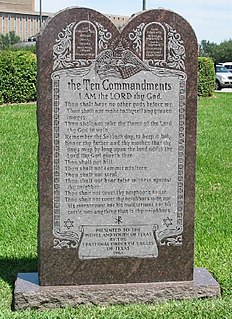 W
WThe Ten Commandments Monument is installed on the Texas State Capitol grounds in Austin, Texas, United States. The Texas Sunset Red Granite artwork was designed by an unknown artist and erected by the Fraternal Order of Eagles of Texas in 1961. It was the subject of litigation in the Supreme Court case Van Orden v. Perry (2005).
 W
WThe Ten Commandments Monument is an outdoor monument installed on the Arkansas State Capitol grounds in Little Rock, Arkansas, in the United States. The monument is being challenged as unconstitutional by the American Civil Liberties Union (ACLU). The ACLU says that the monument demonstrates a religious preference, violating the First Amendment and the religious preference prohibition clause of the Arkansas State Constitution.
 W
WThe Ten Commandments Monument, authorized by the Oklahoma legislature and approved by the governor in 2009, was installed on the grounds of the Oklahoma State Capitol, in Oklahoma City, in 2012. The mere concept engendered years of political controversy, court suits based on religious freedom of religion issues, destruction in 2014 by a man who drove his car into it, replacement in the same location, and even attempts to remove Supreme Court justices who ruled in 2014 that the monument must be removed to another site. After Governor Mary Fallin, key legislators, and the justices agreed on a substitute site, the monument was removed from the capitol grounds in 2015.
 W
WFor the French musical of 2000, see Les Dix Commandements (musical) The Ten Commandments: The Musical is a musical with music by Patrick Leonard and lyrics by Maribeth Derry. The book is adapted from the French musical Les Dix Commandements created by Élie Chouraqui from an idea by Albert Cohen.
 W
WThe Ten is a 2007 American anthology comedy film directed by David Wain and cowritten by Wain and Ken Marino. It was released through ThinkFilm. The film was released on August 3, 2007. The DVD was released on January 15, 2008.
 W
W"Thou shalt have no other gods before Me" is one of the Ten Commandments found in the Hebrew Bible at Exodus 20:2 and Deuteronomy 5:6. It is the central tenet of the Abrahamic religions and prohibits the religion's followers from worshipping gods other than the Lord. The sin of worshipping another god is called idolatry. Historically, the punishment for idolatry was often death.
 W
W"Thou shalt not steal" is one of the Ten Commandments of the Jewish Torah, which are widely understood as moral imperatives by legal scholars, Jewish scholars, Catholic scholars, and Post-Reformation scholars.
 W
W"Thou shalt not bear false witness against thy neighbour" is the ninth commandment of the Ten Commandments, which are widely understood as moral imperatives by Jewish, Catholic, and Protestant scholars.
 W
W"Thou shalt not commit adultery", one of the Ten Commandments, is found in the Book of Exodus of the Hebrew Bible and Old Testament. It is considered the sixth commandment by Roman Catholic and Lutheran authorities, but the seventh by Jewish and most Protestant authorities. What constitutes adultery is not plainly defined in this passage of the Bible, and has been the subject of debate within Judaism and Christianity.
 W
W"Thou shall not covet" is the most common translation of one of the Ten Commandments or Decalogue, which are widely understood as moral imperatives by legal scholars, Jewish scholars, Catholic scholars, and Protestant scholars. The Book of Exodus and the Book of Deuteronomy both describe the Ten Commandments as having been spoken by God, inscribed on two stone tablets by the finger of God, and, after Moses broke the original tablets, rewritten by God on replacements.
 W
WThou shalt not kill, You shall not murder or You shall not kill (KJV), is a moral imperative included as one of the Ten Commandments in the Torah.
 W
W"Thou shalt not take the name of the Lord thy God in vain" is the second or third of God's Ten Commandments to man in the Abrahamic religions.